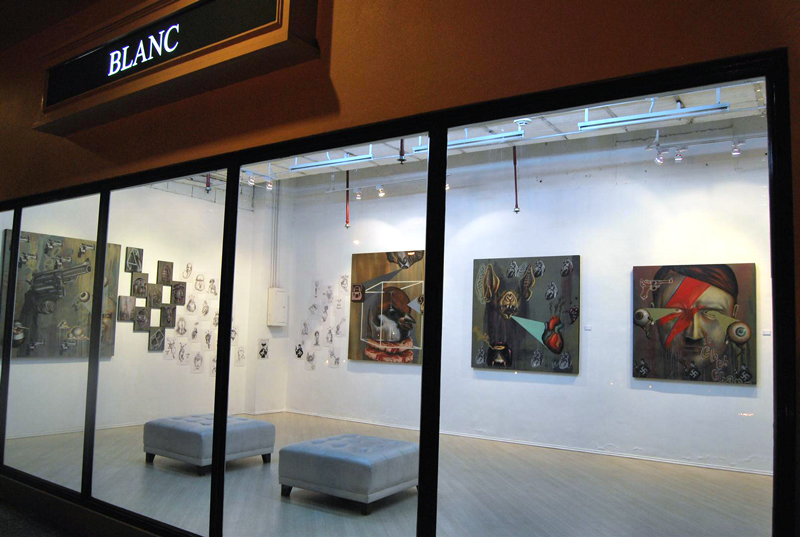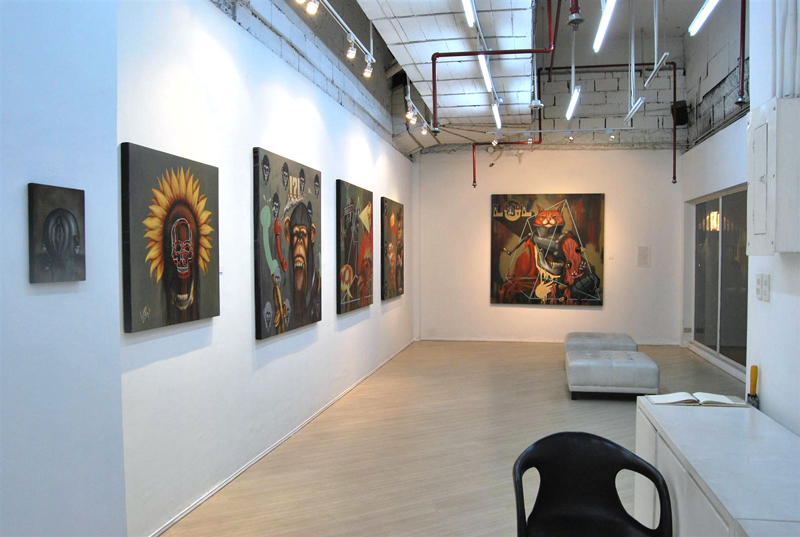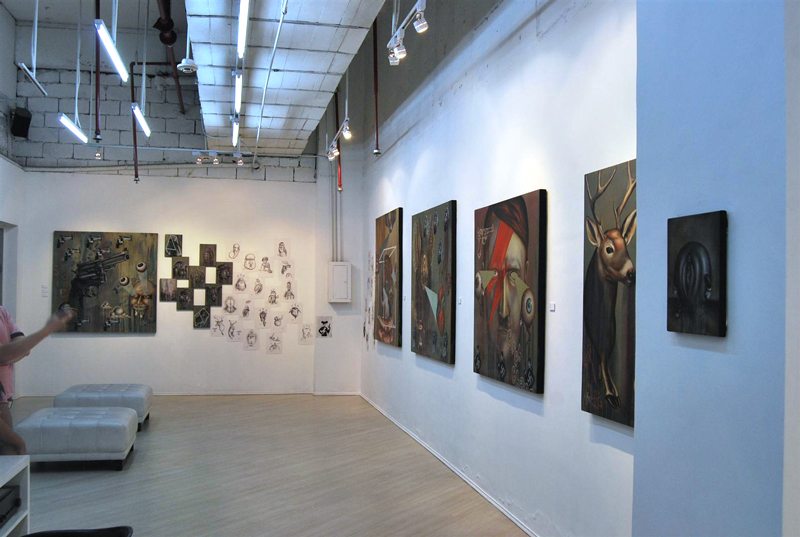Crist Espiritu, "Lost in the Punchline" Show
Crist Espiritu’s third one-man-show now through Nov. 16 at the Blanc Gallery in Philippines. Stop by if you’re in the area. Click on the image for more photos. Or, questions about the paintings, email the artist at senyor_crist@yahoo.com.



The Meme Machine
The Internet is a virtual Wild West, where creative anarchy is allowed to run free. Every once in a while, a riff captures the collective imagination of the online community and spawns a breathtaking number of iterations, all of them based on the same template. Crist Espiritu’s Lost in the Punchline is an inventory of said riffs, technically called “memes”—a concept defined in the dictionary as “an idea, behavior or style that spreads from person to person within a culture”—that have spread virally through social networking sites, blogs, forums, and other online arteries.
Using oil-on-canvas to document the slippery, ever-mutating schizophrenia of the Internet is a brave attempt at the futile. Consider Espiritu’s Man, an eye-popping portrait of Adolf Hitler, the Führer himself with his handlebar moustache, a Luger pointed at his head, and a trio of Swastika-clad gunmen guarding the bottom. And then consider the 500 or so videos that have been “curated” on a YouTube channel called Hitler Rants Parodies . Consider, too, the thousands of multilingual versions that have been uploaded by amateurs.
At the core of the Hitler Reacts meme is a scene from Downfall, a 2004 German movie of about the Führer’s last days. The original clip, set inside a claustrophobic bunker, shows Hitler, played by Bruno Ganz, fucking losing his cool and throwing the mother of all tirades after his generals inform him that Germany’s defeat is imminent.
The climactic scene has been remixed several times over and given new subtitles to make it seem as though Hitler is ranting and raving about whatever topic is current, whether Rebecca Black singing “Friday” or Muammar Gaddafi dying from a shot to the head.
“The homemade spoofs plug into this transformation just about any hubristic entity that might come undone: the subtitles speak to the plight of governments, soccer teams, football teams, Hillary Clinton, John McCain, Adam Sandler,” says a New York Times article titled “The Hitler Meme.” “The meme of the parodies—the cultural kernel of them, the part that’s contagious and transmissible—has proved surprisingly hardy, almost unnervingly so. It seems that late-life Hitler can be made to speak for almost anyone in the midst of a crisis.”
It is this simple-yet-arresting replicability that fascinates Espiritu. Lost in the Punchline taps into the visual power of Internet memes, from Hitler Reacts to LOLcats—image macros or pictures superimposed with funny text (“I CAN HAZ CHEEZBURGER?”). The latter, ancient by Internet standards, created an online subculture of talking pussies and, in turn, paved the way for other remixes (Espiritu’s punning Pussy painting included).
Espiritu simulates the LOLcat effect by juxtaposing straightforward depictions of his subjects with text and ancillary images. The overall effect is discombobulating. Why combine the head of a sparrow with slabs of raw meat with a question mark with a decapitated man with a capital letter “B”? Why the assface? Why the sunflower skull?
Lost in the Punchline promises no explanations. You either get it—whatever “it” is—or you don’t. “I guess that’s just how I see existence as a whole lately,” Espiritu says, “as a joke.” His nihilist stance is part and parcel of Digimodernism, a term coined by writer Allan Kirby.
Kirby explains that Digimodernism is the cultural effect of new technologies. “It’s the impact of computerization on texts and the arts. It’s a whole new cultural paradigm, the successor to postmodernism which bit the dust around the turn of the millennium.”
Espiritu also presents 3-D paintings, monochromatic works with red-and-cyan outlines that mimic anaglyphs. Aside from being a wink to 3-D movies that have invaded cinemas, the series is a metaphor for the multiple lives people lead. Today’s Netizens have digital lives and tangible, in-the-flesh lives.
“We are essentially schizos,” Espiritu says of the effect that Kirby describes as a sort “subtle autism.” In the middle of this Digimodern madness is the artist, who paints bits and bytes of Internet snark with oil and brush.